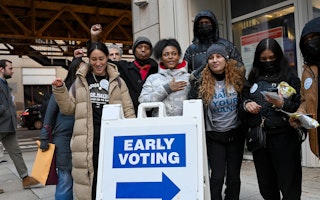Why President Obama Must Go to UNGASS
By Jasmine Tyler
Prisoners have written me letters all of my life. Growing up, they came from my dad. Today, they come from somebody else’s family member or friend, someone who is in jail because they committed a non-violent drug-related crime to support an addiction.
Starting in the 1980s, my dad and many other black men like him were swept into a system that criminalized drug addiction. Instead of receiving help, they served time. Instead of accompanying my dad to the D.C. methadone clinic, we visited him in prison. As an injection drug user, he contracted HIV and, then, AIDS. He died nine years ago.
Today, everyone from the president of the United States to prosecutors and police chiefs are seeking to implement public health- and evidence-based policies to stem the scourge of drug addiction and related crime. The president has delivered eloquent speeches to civil rights groups. He’s huddled with prison inmates in Oklahoma. He’s comforted suffering families in West Virginia.
But if Obama chooses not to join the world’s leaders at the United Nations General Assembly Special Session on drugs (UNGASS) in April, his commitment to fully implementing this approach and making it a pillar of U.S. foreign policy could be undermined. By showing up, President Obama can prove to the world that the United States has moved on from its failed war on drugs. He can demonstrate a real shift to a public health-based approach by telling the world what he’s been saying for the better part of two years.
Last year, for example, at a town hall meeting in Kingston, Jamaica, Obama said that the “path we have taken in the United States in the so-called war on drugs has been so heavy in emphasizing incarceration that it has been counterproductive…If we combine a public health perspective…trying to get [people] treatment…with economic development and alternative opportunities for youth, then I think we can strike the right balance.”
That's what the world needs to hear from the president at UNGASS. If Obama gave that speech, it would represent a clear break with a failed past. The last time a U.S. president spoke at a United Nations meeting on drug policy was in 1998, when then-President Bill Clinton focused exclusively on law enforcement cooperation among countries and efforts to reduce the supply of drugs. Clinton has since expressed regret for this strategy—earlier this year, he admitted that by signing a 1994 crime bill that imposed mandatory minimum sentences for low-level drug offenses, he “made the problem worse.”
But despite the eloquent words and symbolic visits to a federal prison, it’s unclear if there’s going to be any real follow-through on the world stage. Six weeks before UNGASS begins, it’s still uncertain if the president will attend, or whether he will send a lower ranking official to deliver the U.S. message. Some civil society groups question whether the White House and State Department are listening to them.
The administration has taken some worrying steps. U.S. government officials are hosting events to promote drug courts, which run contrary to the public health approach to drug addiction. After all, drug courts are housed within our criminal justice system and often exclude scientifically proven medication-assisted therapies. The White House, which previously hosted a summit on successful pre-booking diversion programs, should be exploring more ways to replicate those programs that have succeeded in places like Seattle and Sante Fe.
There’s also an alarming lack of transparency in the process to negotiate the final UNGASS communique. If the document’s language is going to be written a month before UNGASS at an exclusive meeting in Vienna—where most countries do not have an embassy or representatives—it would completely undercut the Obama administration’s efforts. Beyond that, it’s a cynical move for governments, ours included, to say one thing at home and state another as official policy.
In the final communique, the United States could push for language that promotes health and human rights, acknowledges the effectiveness of harm reduction, and emphasizes the public health and safety benefits of decriminalization.
If President Obama ever wanted to change the terms of the debate, as he has done on many flawed and failed policies rooted in the past, this would certainly do it. By doing so, it could mean that sometime in the not too distant future, more people suffering from drug addiction would be receiving the services they need in their communities instead of writing to their loved ones from jail cells or having eulogies written about them.
Until May 2017, Jasmine Tyler was the senior policy advisor for drug policy and global health for the Open Society Foundations.


